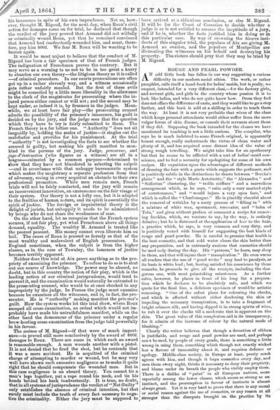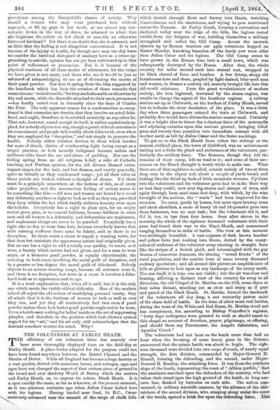ROUGE AND PEARL POWDER. A N odd little book has
fallen in our way suggesting a curious CI. difficulty in our modern social ethics. ' The work, or rather pamphlet, calls itself a hand-book for ladies' maids, but ispally, we suspect, intended for a very different clasii,—for the factory girls, and servant girls, and girls in the country whose passion it is to look like ladies, and who do not quite know how. Dress they feel does not efface the difference of caste, and they would like to go a step farther, and this book is sold at a shilling in order to teach them the way. At least it is not very probable that wives of the class which keeps personal attendants would either suffer from the more vulgar forms of skin disease, or consult their servants about them if they did. Supposing the book intended for the classes we have mentioned its teaching is not a little curious. The compiler, who says he is much indebted to some French original, is apparently honest enough, really understands the virtue of clean water and plenty of it, and has acquired some distant idea of the value of strong rough towelling. We might take him for an apothecary but that he seems to be afflicted with a sort of ladies'-maid con- science, and to feel a necessity for apologizing for some of his own recipes. He expatiates upon the advantages of different methods of dressing the hair with a gusto which suggests the perfumer, and is positively subtle in the distinctions he draws between " Bertha's plaits" and the "style Marie Antoinette," the " Alexandra" and " Solferino " clustering, the "trellis coiffure" and a marvellous arrangement which, as he says, "suits only a very marked style of countenance," and "would injure a very open face," and which is called the "Charlemagne." He is placidly cheerful about the removal of wrinkles by a nasty process of "filling in" -wtth a mixture of white wax, spermaceti, rose water, and "balm of Tolu," and gives without preface or comment a recipe for remov- ing freckles, which, we venture to say, by the way, is entirely delusive ; but he is distressed at the application of beer to the hair, a practice which, he says, is very common and very dirty, and is positively vexed with himself for suggesting the best kinds of rouge and pearl powder. He is careful to premise that health is the best cosmetic, and that cold water clears the skin better than any preparation, and is extremely anxious that cosmetics should be used only during the day. His "patrons," he fears, may sleep in them, and that will injure their "transpiration." He even warns all readers that the use of "pearl white" may lead to paralysis, as its basis is white lead ; but, having satisfied his conscience by these remarks, he proceeds to give all the receipts, including the dan- gerous one, with most painstaking minuteness. As a further salvo, however, he places in front of his long list a prepara- tion which he declares to be absolutely safe, and which we quote for the final line, a delicious specimen of would-be artistic reasoning. "One of the safest plans for colouring the cheeks, and which is effected without either deadening the skin or impeding the necessary transpiration, is to take a fragment of bright crimson silk, and having dipped it in strong spirits of wine, to rub it over the cheeks till a moderate tint is apparent on the skin. The great value of this complexion-aid is its transparency, for it admits of the increase of colour by the natural mode of blushing."
Clearly the writer that though a decoction of ribbon is justifiable, and rouge pearl powder are used, and perhaps must be used, by people of every grade, there is something a little wrong in using them, something which though not exactly wicked has a flavour of immorality about it, and requires defence or apology. Middle-class society, in Europe at least, pretty much agrees with him, and though it buys cosmetics every day, and uses them every night, thinks it necessary to deny their propriety, and blame under its breath the people who visibly employ them.
There is a dislike of "paint" in all European nations, more especially among the lower classes, which seems as strong as an believes and prevalence among the disreputable classes of society. Why should a woman who may wear purchased hair without reproach, or fill up gaps in her teeth, or use almost any con- ceivable device in the way of dress, be ashamed to admit that she brightens the colour on her cheek or smooths an otherwise furrowed forehead ? Yet there is no doubt that she is ashamed, and as little that the feeling is not altogether conventional. It is not because of the injury to health, for though men may one day learn to consider the habitual disregard of sanitary laws as a crime ap- proaching to suicide, opinion has not yet been cultivated up to that point of refinement or precaution. Nor is it because of the physical nastiness of all these modes of adornment, for the recipe we have given is not nasty, and those who use it would be just as ashamed of acknowledging its use as of discussing the merits of their pearl powder. Nor does it spring from the idea suggested by the handbook which has been the occasion of these remarks that cosmetics are "unfashionable,' for they are fashionable or otherwise by fits and starts, while the discredit attached to their use is permanent —has hardly varied even in intensity since the days of Charles the First. The only apparent reason for a condemnation so excep- tional is that cosmetics are deceits, that they involve an acted false- hood, and ought, therefore, to be avoided as strictly as any other lie. That rule, however, sound enough in itself, is rather capriciously ap- plied, for nobodyobjects to a wig, though a gentle ridicule attaches to its concealment, and people talk readily about false teeth, even when they are employed for "deception," and not simply to preserve the health. Nobody either rebukes devices in dress which involve far more of deceit, thinks of condemning tight lacing except as a stupid practice, or feels morally indignant because tailors and milliners alike know the use and abuse of padding. Nor can the feeling spring from an old religious belief, a relic of Catholic teaching and Puritan opinion, for the old divines blamed extra- vagant shapes for the hair, and low dresses, and vanity generally, quite as bitterly as they condemned rouge ; yet all their rules on these points are broken without a thought of shame. Yet there must be a principle somewhere at the bottom of this, as of every other prejudice, and the unconscious feeling of society seems to be something like this :—All men and women are bound to conceal any deformity, and have a right to look as well as they can, provided they keep within the law which tacitly enforces honesty even upon the toilette. Everybody has a right to glass eyes, for an empty socket gives pain, or to conceal baldness, because baldness in some men and all women is a deformity, and deformities are unpleasant, and unpleasant things are never to be paraded. Everybody has a right also to-day to wear false hair, because everybody knows that with existing coiffures there must be falsity, and so there is no -deception. So there exists a claim to supply a wanting tooth, for • that does but maintain the appearance nature had originally given. But no one has a right to add a totally new quality, to assert, as it were, a beauty which nature had not given, and for a man to wear stays, or a brunette pearl powder, is equally objectionable, the -covering in both cases involving the social guilt of deception, and in a greater or less degree the moral guilt of falsehood. Nobody .objects to an actress wearing rouge, because all actresses wear it, and there is no deception, but worn in a room it involves a false- hood both as to appearance and to age.
It is a weak explanation that, when all is said, but it is the only one which meets the visible ethical difficulty. Men of the modern school all reject the old notion of mortifying personal vanity, they all admit that it is the business of women to look as well as ever they can, and yet they all instinctively feel that even if pearl powder makes them look better pearl powder ought not to be worn. Even a hairdresser writing for ladies maids on the art of suppressing pimples, and therefore in the position which best allows a cynical regard for his "art," and his art only, still acknowledges that the Instinct somehow worries his mind. Why?



































 Previous page
Previous page